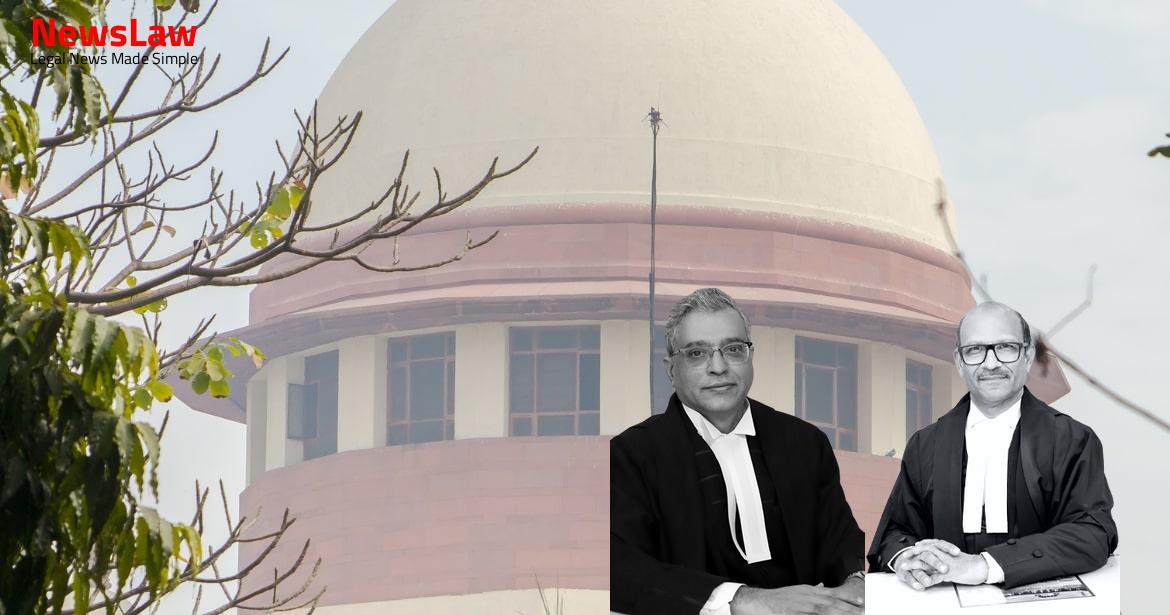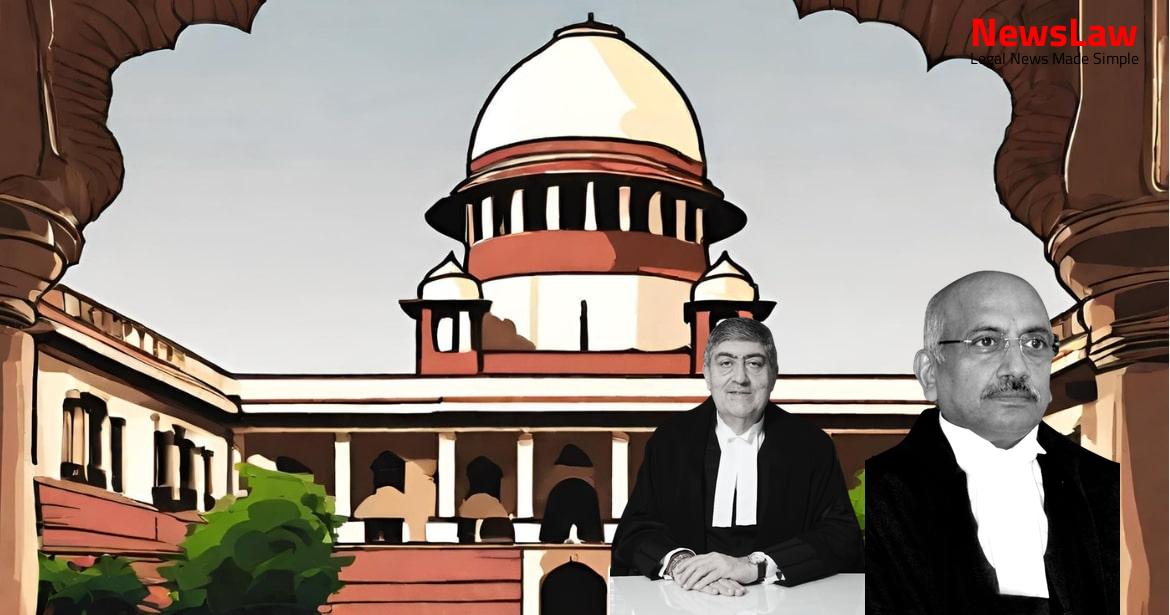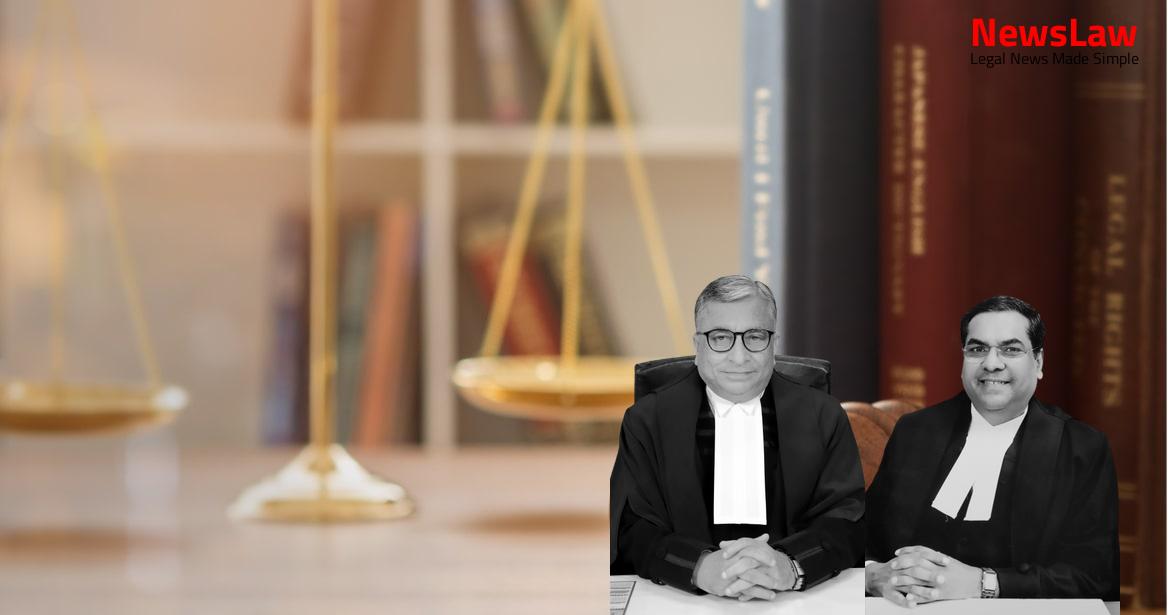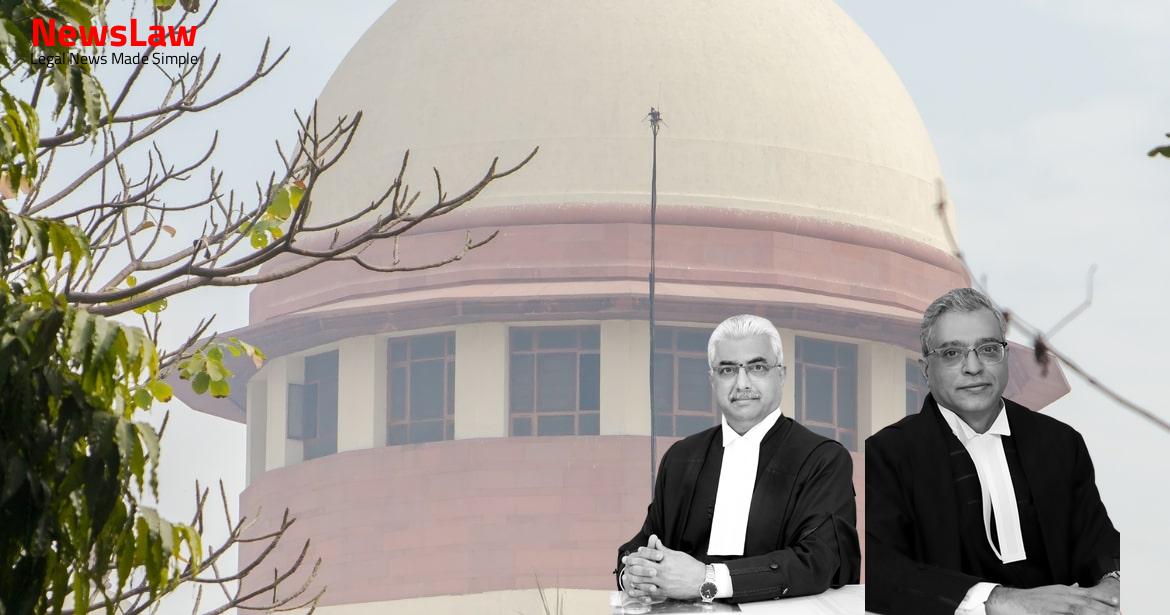In a significant legal decision, the Supreme Court of India has quashed the decree in the case of a land dispute. The case involved a disagreement between parties over a transaction that was initially deemed a loan rather than a sale agreement. Find out more about this ruling and its implications for the involved parties.
Facts
- The trial Court found the transaction to be a loan rather than a sale agreement.
- Respondent was not entitled to specific performance but was entitled to recover earnest money with interest.
- Trial Court decreed the suit in favor of the respondent for a refund of Rs. 16,00,000 with interest.
- First Appellate Court upheld the trial Court’s decision.
- Issue regarding alternative relief for Rs. 19,00,000 was partly decided in favor of the respondent.
- Appellant failed to appear for sale deed execution as per the agreement.
- First and second appeals by the appellant were rejected by respective courts.
- The High Court dismissed the second appeal and affirmed the decision of the First Appellate Court.
- The respondent-plaintiff filed a suit seeking specific performance of an agreement to sell regarding a piece of agricultural land.
- The possession of the land was handed over to the respondent-plaintiff at the time of the agreement.
- The appellant-defendant, an illiterate, had his thumb impression taken on blank stamp papers by the plaintiff and his brother.
- The disputed agreement was alleged to be fraudulent and attested by witnesses.
- The appellant-defendant breached the agreement by not being ready to execute and register the sale deed.
- The respondent-plaintiff sought recovery of Rs. 19,00,000 as an alternative relief.
- The appellant-defendant claimed the agreement was without consideration and prepared fraudulently.
- The respondent-plaintiff marked his presence before the Sub-Registrar to show readiness for registration.
- The appellant-defendant denied receiving sale consideration and being bound by the agreement.
- The respondent-plaintiff’s version was supported by the attesting witnesses.
Also Read: Supreme Court Judgment on Arbitral Award Dispute
Issue
- The issue of whether the plaintiff and defendant were co-owners/co-sharers in possession to the extent of their share in the disputed property was raised.
- Determining if the cause of action had indeed arisen for the plaintiff to file the present suit and if the plaintiff had the necessary locus standi to do so were part of the issue.
- The argument of the suit being bad for non-joinder of necessary parties was considered in this issue.
- Evidence was presented regarding the execution of the disputed agreement by the plaintiff and their willingness to have the sale deed executed.
- The expectation of immediate possession after paying a large sum and fixing a future date for sale deed execution was discussed in this issue.
- The maintainability of the suit in its present form was also brought up as part of the issue.
- The entitlement of the plaintiff to recover Rs.19,00,000/- from defendant no. 1 was a point of contention within this issue.
- The consideration of whether the plaintiff should be granted the relief of permanent injunction as requested was part of this issue as well.
Also Read: Judgment by the Supreme Court Of India: Upholding the Principles of Natural Justice
Arguments
- The petitioner, who is a Head Constable in Punjab Police, did not obtain permission from the department to purchase the suit land.
- The amount in question, Rs.16 lakhs, was not withdrawn from any bank but was in the petitioner’s house in the form of currency notes.
- The petitioner’s brother runs a commission agent shop at Mandi Amarkot.
- Possession of the suit land was not delivered as per the agreement to sell.
- The petitioner did not declare the transaction amount in his Income Tax returns.
- The petitioner denied the suggestion that his brother obtained the defendant’s thumb impression on blank stamp papers through fraud.
- The market rate of land in Village Cheema Khurd was stated to be around Rs.9-10 lakhs per Killa.
- Learned counsel representing the respondent- plaintiff supported the findings in the impugned judgments.
- The trial Court, First Appellate Court, and High Court arrived at a conclusion that the transaction was a loan between the respondent-plaintiff and the appellant-defendant.
- The appellant-defendant was held liable to reimburse the loan amount secured from the respondent-plaintiff.
- The judgments of the Courts below were considered well-reasoned and not to be reversed under Article 136 of the Constitution of India.
- Findings in the judgments of the Courts below are deemed valid and not based on misreading of facts.
- The appeal should be dismissed as per the learned counsel for the respondent-plaintiff.
Also Read: Supreme Court Judgment: Disputed Auction Sale of Society’s Property
Analysis
- The disputed agreement appears suspicious as significant facts and discrepancies are highlighted.
- The appellant-defendant denied the execution of the disputed agreement and receiving the amount mentioned in it.
- The respondent-plaintiff, a Police Constable, did not seek permission from the department before entering a high-value property agreement.
- The agreement stated a large sum was paid upfront, and the remaining balance was a small fraction of the total value, raising doubts.
- No logical reason for the delay in executing the sale deed stated in the agreement is evident.
- The agreement detailed severe penalties in case of default by the appellant-defendant.
- The complete agreement was not signed or thumb-impressed on every page.
- The agreement mentioned delivery of possession, which was not fulfilled by the defendant.
- The respondent-plaintiff did not approach the defendant for over 16 months to execute the sale deed.
- No evidence of advance payment or readiness to pay balance amount at Registrar’s office was presented by the respondent-plaintiff.
- The agreement was typed in Gurmukhi, and discrepancies in who purchased the stamp papers were noted.
- Non-appearance of the appellant-defendant at the Registrar’s office led to the filing of the subject suit.
- The agreement mentioned penalties and legal actions in case of default by either party.
- The plea for alternate prayers in the subject suit indicated a lack of execution of sale deed or refund of earnest money.
- The plea for invoking special leave under Article 136 against concurrent findings was elaborated on.
- Interference with concurrent findings in an appeal under Article 136 of the Constitution should be sparingly done, especially when the impugned judgment is not absolutely perverse.
- Article 136 grants wide powers without technical hurdles but interference is limited to rare cases of manifest illegality or serious miscarriage of justice.
- Concurrent findings of fact are not interfered with unless they are based on no evidence, perverse, built on inadmissible evidence, or ignore vital evidence favoring the convict.
- The plaintiff filed the suit claiming the defendant executed an agreement to sell agricultural land, and the courts’ findings are to be analyzed based on the principles mentioned.
- Another plausible view cannot be a reason to substitute the confirmed view. Concurrent findings are binding unless tainted with perversity according to settled legal position.
- The court finds it fit to exercise its powers under Article 136 of the Constitution of India to interfere with the impugned judgments
- The court concludes that the entire case of the respondent-plaintiff regarding the disputed agreement, payment of Rs. 16,00,000 in cash, and appearance at the office of the Sub-Registrar is fraudulent and a concoction
- Vital factual aspects were ignored by the lower courts
Decision
- The judgment and decree dated 18 February, 2013 rendered by the trial Court, judgment dated 20 March, 2017 passed by the First Appellate Court, and the judgment dated 25 April, 2018 rendered by the High Court were considered to suffer from perversity on the face of the record.
- The conclusion was reached that the mentioned judgments could not be sustained.
- The appeal was allowed, succeeding in its argument.
- Pending applications were disposed of as a result.
- The impugned judgments were quashed and set aside.
- Decree preparation was ordered accordingly.
Case Title: LAKHA SINGH Vs. BALWINDER SINGH (2024 INSC 744)
Case Number: C.A. No.-010893-010893 – 2024



